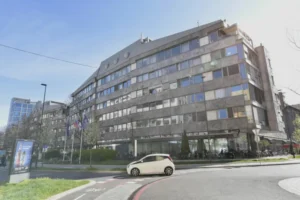The Court of Audit of the Republic of Slovenia – although ideologically quietly controlled by the left-wing executive – issued a positive opinion on the draft final account of the budget of the Republic of Slovenia for 2024, but when it comes to the regularity of the implementation of the state budget, it issued a reservation and a qualified opinion. The reservations, however, are such that the president of the court would likely call on the government to resign if it were a right-wing one.
The iron rule of economics says that people will never be as rational in spending someone else’s money as they are in spending their own. That is why they spend it without hesitation, as they do not perceive it as their own – because in reality, it is not. This is particularly true of the current government of Robert Golob, which has turned a solid foundation from 2022 into such a public finance disaster that it will take us decades to recover.
In its report, the Court of Audit of the Republic of Slovenia refers to irregularities and shortcomings in the implementation of the budget, which indicate poor financial discipline and control, but if we look deeper into the report, we see that this is an overly friendly characterisation of what the government has been doing so far and what has been discovered. Between the lines, the key conclusions indicate that these are blatant cases of corruption, irrational spending, and in many cases, incompetence.
What did the Court of Audit discover?
Although revenues were 1.6 billion euros higher than in the previous year, the state generated a deficit of 800 million euros – in other words, we paid more into the budget, but the state spent so much that it still generated a deficit of almost 1 billion euros. The Court of Audit is not critical enough of this fact, but perhaps an economist or at least the Fiscal Council would be. It is important to note that the state received almost 425 million euros less than planned from the European Union, but paid 636 million euros into its budget, meaning that due to poor absorption of cohesion funds, we have become de facto net contributors to the European Union.

The Court of Audit also found that more than 531 million euros earmarked for recovery from natural disasters had not even begun to be used by the end of 2024, while municipalities had used almost 19 million euros in ineligible funds, and the competent Ministry had not even asked them to return the funds. The government exceeded the permitted use of the budget reserve without a legal basis, and funds from the same reserve were also used for costs that could have been planned in advance. In other words, we are talking about complete fiscal chaos.
The Court of Audit also identified irregularities in the payment of salaries and allowances, where there were repeated violations of the law, and in public procurement, where there were unacceptable changes in the value of projects, incorrect selection procedures, and uneconomical conduct.
The ministries also did not exercise adequate control over budget users – for example, the national media outlet, Radio-Television Slovenia (RTVS) received more than 12 million euros without any verification of the validity of the claims, and ministries often do not even check the use of public funds for which they are responsible. Similarly, public institutions in healthcare, education, and elderly care, which are under the jurisdiction of government departments, have been recording rents as their own income for years instead of transferring them to the state treasury.

After reading the Court of Audit’s “reservations,” did you think these were minor oversights or actual violations that point to systemic corruption, ignorance, inability to manage departmental budgets, and a general tendency toward complete indifference to the spending of taxpayer money? After reading the report, it is clear that if the government were of a different political persuasion, the streets would already be flooded with protesters waving the flags of the Socialist International.
Modus operandi from 2022 onwards
The report by the Court of Audit, however, is nothing unusual or surprising. Those who have been following the Golob government since the beginning of its term know very well that the current rulers have no qualms about spending taxpayers’ money. Almost every month, we witness some minor scandal involving Golob’s government, where it is blatantly obvious that taxpayers’ money is being spent irrationally, but what people remember most are the “big three” scandals that shook the public and, in some cases, even led to the resignation of ministers due to public pressure.
Let us recall the Litijska 51 affair: in December 2023, the purchase of the building that was supposed to become the courthouse at Litijska Street 51 in Ljubljana was completed for 7.7 million euros. The Court of Audit found that the Ministry of Justice had failed to carry out any checks of the building during the preparation of this project, and that the investment documentation had been prepared incompletely and incorrectly, and in contravention of the applicable regulations and laws. The purchase was made literally overnight, without proper supervision and without the approval of the National Assembly. In addition, it was found that most of the funds for the purchase were provided by reallocating funds from the general budget reserve, even though there was no legal basis for such a reallocation. Worst of all, the Ministry significantly overpaid for the building – businessman Sebastjan Vežnaver purchased the building on Litijska Street in November 2019 at the fourth public auction of the company NIKOM for 1.7 million euros, which means that the state paid almost 6 million euros more than the value paid by Vežnaver himself for the property. Prior to this, the building had been valued at 2.9 million euros, but this valuation was carried out before Vežnaver’s purchase. When the Ministry of Justice proceeded with the purchase, it did not commission its own valuation, but accepted the valuation commissioned and paid for by the seller. Then-Minister of Justice, Dominika Švarc Pipan, resigned because of this, but never accepted blame. The scandal has since died down, but the Ministry is stuck with a dilapidated building for which it cannot find a suitable use.
Another equally brazen theft of taxpayer funds occurred at the Ministry of Digital Transformation, headed by Emilija Stojmenova Duh. In 2022, the Ministry purchased 13,000 laptops worth a total of 6.5 million euros, without knowing who the computers were actually intended for, nor under what law they should be distributed. The Court of Audit found that the purchase was not made in accordance with the principles of efficiency and economy. In addition, cartel agreements were found between four companies that participated in the transaction. Some of the computers have still not been distributed, even two years after the purchase. Some experts suggested at the time that this was an agreement between the Minister and the importers of laptops, allowing them to get rid of old stock – these were previous-generation laptops that were already obsolete at the time of purchase. While the computers were waiting for their owners, the warranty was already running out – and in some cases had already expired. Stojmenova Duh has since resigned, but not because of the scandal, but because she was being driven in a government vehicle with the signal lights on, in order to avoid traffic. There has been no epilogue to the affair of the 13,000 computers to this day.
The third scandal was twofold, and the person responsible for it was the then-Minister of Public Administration, Sanja Ajanović Hovnik, who was at the centre of several scandals. Her business trip to New York cost 33,000 euros, which sparked criticism due to the high costs and questions about the necessity of the visit, especially since four of her colleagues from the Ministry also went on the trip to the USA with her. In addition, it was revealed that her former company, the Institute for Gender Equality Studies (IPES), had received funds from a public tender directly supervised by the Minister herself. The tender was even changed to allow funds to be allocated to these organisations, and her mother’s company advised the tender applicants. Ajanović Hovnik resigned, the matter was politically resolved, and then, in accordance with old Slovenian folklore, the whole affair disappeared without a trace. There was no criminal epilogue, and there probably won’t ever be one.
Given how lenient the Court of Audit and other law enforcement agencies are towards the current government, it is clear that this practice will continue until the end of the term. There is simply no motivation for change.
I. K.


